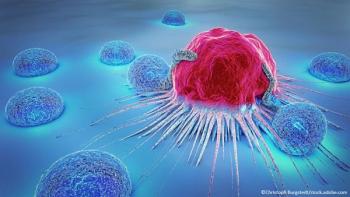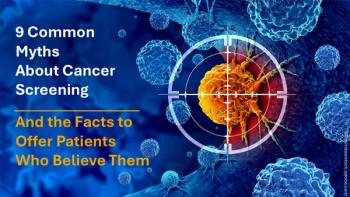
AUA: Testosterone and PSA Intertwined in Prostate Cancer Risk
ANAHEIM, Calif. -- Testosterone levels appear to have a major influence on PSA values and may warrant watching for patients at high risk of prostate cancer, a large screening program suggests.
ANAHEIM, Calif., May 25 -- Testosterone levels appear to have a major influence on PSA values and may warrant watching for patients at high risk of prostate cancer, a large screening program suggests.
Higher PSA values had a near-linear association with rising testosterone levels. said Al Bareqawi, M.D., of the University of Colorado in Denver, at the American Urological Association meeting here.
The strong correlation between the two measures suggests that testosterone might have an impact on the PSA cutoff value for recommending prostate biopsy, he added.
"PSA value by itself is not perfect," said Dr. Bareqawi. "The correlation between PSA and testosterone is very much indicative of a testosterone level that may actually improve our protection against prostate cancer. It may improve the meaning and interpretation of the PSA value."
Yet the results of the study do not mean that testosterone should be measured along with PSA when screening for prostate cancer, he added. That issue needs to be resolved in a validation study that would include prostate biopsy.
The impact of testosterone levels in the setting of PSA screening remains controversial under the best of circumstances, Dr. Barqawi noted.
Androgen stimulation of the prostate likely plays a role in the development of benign prostate hypertrophy and prostate cancer. PSA values are directly related to prostate size and growth in both benign and malignant states.
So the investigators evaluated data from a national prostate screening program in an attempt to clarify the relationship between the two biomarkers,
Dr. Barqawi and colleagues reviewed PSA and testosterone values obtained from 8,794 men who participated in the program in 2004 and 2005. By linear regression analysis, testosterone as a continuous value was analyzed with respect to PSA, age, and age by PSA interaction. Testosterone values were stratified into four ordinal levels (?150 ng/ml, N=238; 150 to 230 ng/ml, N=896; 230 to 346 ng/ml; and >346 ng/ml, N=5,159). Logistic regression was used to model testosterone level by PSA value and age.
The mean age of the study population was 60.9, and their testosterone level averaged 412.5 ng/mL. Linear and logistic regression revealed a significant positive association between PSA and testosterone values (P
Newsletter
Enhance your clinical practice with the Patient Care newsletter, offering the latest evidence-based guidelines, diagnostic insights, and treatment strategies for primary care physicians.

































































































































